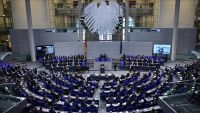Washington — Sen. Marco Rubio's changing stance on immigration has alienated advocates on both sides of the debate, and analysts say the contentious issue could trip up the Florida Republican in his bid to become the first Latino president.
Rubio is expected to officially announce his candidacy Monday in Miami.
"Immigration is the issue that took him from being the Tea Party darling to the Tea Party outcast," said Aubrey Jewett, a political science professor at the University of Central Florida. "It's also the issue that his opponents could use to paint him as a flip-flopper."
Rubio, who was elected to the Senate in 2010 with the strong backing of Tea Party Republicans, surprised conservatives in 2013 when he helped champion a sweeping, bipartisan immigration bill. The bill sought to beef up border security while also creating a pathway to citizenship for many of the 11 million undocumented immigrants living in the USA.
The bill, crafted by Rubio and seven other senators, known as the "Gang of Eight," was approved by the Senate in 2013. However, it stalled in the House when Tea Party conservatives denounced it as amnesty and convinced GOP House leaders not to bring it to a vote.
Rubio, stung by criticism from fellow conservatives, began backing off his support for the bill soon after the Senate passed it. In February, he told the Conservative Political Action Conference that he has learned his lesson on the issue and now believes that the Southwest border must be secured before anything can be done to help undocumented immigrants.
"You have 10 or 12 million people in this country, many of whom have lived here for longer than a decade, have not otherwise violated our law other than immigration laws. I get all that," Rubio said. "But what I've learned is you can't even have a conversation about that until people believe and know – not just believe, but it's proven to them – that future illegal immigration will be controlled. That's the single biggest lesson of the last two years."
Source: USA Today









